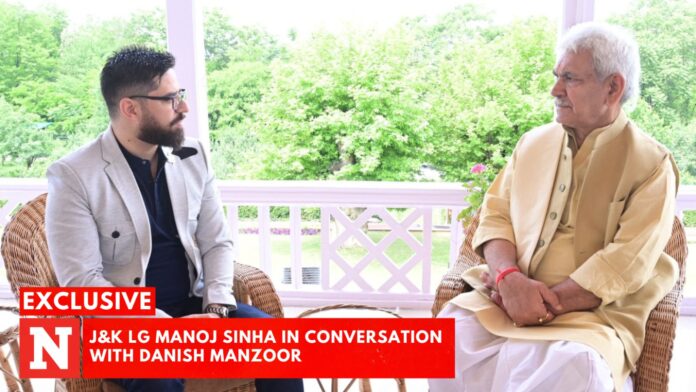India’s G20 presidency kicked off on a high note when Prime Minister Narendra Modi called for finding common ground on global issues in March 2023. Continuing the trend, the 3rd Tourism Working Group meeting in Srinagar, Jammu and Kashmir (J&K), dominated Indian and international headlines. Pakistan expressed its reservations, while India maintained that its neighbor has no locus standi on India’s internal matters.
Earlier, while at the Shanghai Cooperation Organisation (SCO) meeting in Goa, India, Pakistan’s Foreign Minister Bilawal Bhutto Zardari issued a veiled threat to India about the G20 meeting in Srinagar. “Obviously we condemn it, and at the time we will give such a response that it will be remembered,” Bilawal had said. Pakistan’s foreign ministry later claimed that the statement was misinterpreted.
Pakistan’s veiled threats didn’t go unanswered, as India’s external affairs minister, Dr. S. Jaishankar, responded to Bhutto’s statements and called him a “promoter, justifier, and spokesperson of the terror industry.” He further said. “They [Pakistan] have nothing to do with the G-20, nothing to do with even Srinagar and Kashmir. They should answer, ‘When will they vacate the illegally occupied territories of Jammu and Kashmir?'”
Newsweek
India Successfully Holds G20 Meet in Kashmir
The G20 delegates arrived in J&K’s summer capital, Srinagar, on Monday, May 22, to attend the third tourism working group meeting at the Sher-e-Kashmir International Convention Centre (SKICC) by the banks of the famous Dal Lake. In the first formal meeting of the group, five key priority areas—green tourism, digitalization, skills, MSMEs, and destination management—were discussed. Post deliberating at the conference, the delegates were seen enjoying and experiencing J&K’s local cuisine, art, culture and scenic beauty.
The delegates who participated in the deliberations applauded the Indian arrangements and the execution of the successful meeting. From Singapore to South Korea and the Netherlands to France, delegates from the participating G20 countries called the event a big success.
“The G20 meeting (in Kashmir) was successful. It is a wonderful place, (and) the people here are very kind. I hope more people come here to discover the beauty and diversity of India,” Korean Ambassador to India Chang Jae-bok said in a statement.
“A big thank you to G20, J&K Tourism, Srinagar administration, and Tourism Ministry of India for a stellar experience at the #G20InKashmir 3rd Tourism WG. We also thank the people of J&K for warmly inviting us to your home. We are honored and will be back,” tweeted Singapore’s high commissioner in India, Simon Wie Kuen Wong.
“It puts Kashmir back on the map, and it has shown us that Kashmir is a beautiful place. It will help tourism in Kashmir, but I hope it will also help tourism in the Netherlands. It’s been three fantastic days, Kashmir is very beautiful. The meetings were very well organized and insightful. So I am happy to bring this all back to the Netherlands,” YN Bruggeman, a delegate from the Netherlands, was quoted in the Indian media.
“We thank the Indian presidency for the excellent organization of the G20 3rd Tourism Working Group Meeting in Srinagar, which led to very productive discussions. France participates actively in all G20 tracks,” the French Embassy in India tweeted upon the conclusion of the G20 meeting in Srinagar.
Newsweek also spoke to a few educators from Kashmir to understand what they felt about it.
“The G20 Tourism Working Group Meeting in Srinagar was a remarkable move by Indian Prime Minister Narendra Modi-led government to showcase Jammu and Kashmir in a new light. As the first and biggest ever international event since the abrogation of Article 370 and 35A in August 2019, it marks a new era for J&K, which leaves the days of terror, propaganda, conflict, and shutdowns in the past,” Professor Tariq Chalkoo, local educationist and expert on solar energy, wind energy, and media studies, told Newsweek.
“The only issue perhaps people faced was the traffic related inconvenience. But to be fair, we have seen far worse. This was nothing, comparatively. Only a few areas had restricted access this time,” advocate Feroze Sofi told Newsweek.
With the G20 meeting in Srinagar, which focused on tourism, J&K ushers in a new era of growth, prosperity, employment creation, infrastructure development and security. Given the restoration of normalcy in the region, Jammu and Kashmir witnessed an unprecedented rise in the number of tourists arriving in the Valley.
“I see that the J&K administration has undertaken several initiatives to foster growth in the region, creating employment opportunities, improving the infrastructure, boosting exports of local products, implementing education reforms, and contributing to the overall GDP of the country. In addition, the administration has also been able to curb the terror activities in the region,” Professor Naseer Iqbal, Registrar of the Islamic University of Science and Technology, told Newsweek.
The Newsweek Interview: Jammu and Kashmir Lt. Governor Speaks
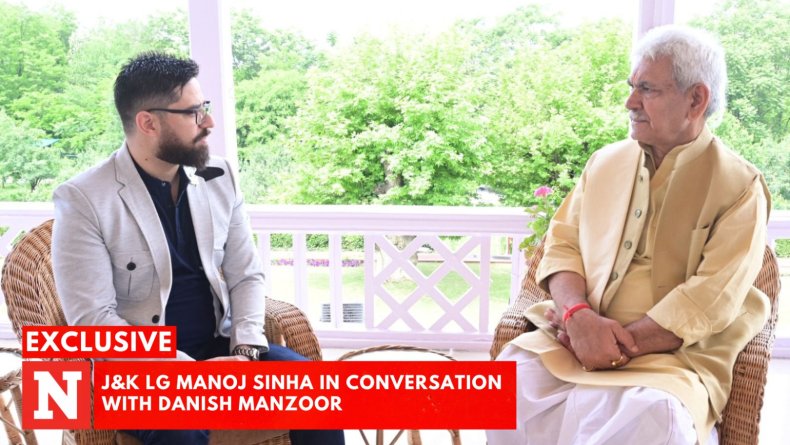
Newsweek
As the G20 meeting in Kashmir came to an end, the lieutenant governor of J&K, Manoj Sinha, spoke exclusively to Newsweek‘s Asia editorial director, Danish Manzoor Bhat, in Srinagar. The text has been lightly edited.
Q: Lt. Governor Sinha, congratulations on the successful conclusion of the G20 meeting in a place as beautiful as Srinagar. But this territory has been troubled for many decades; as per you, how significant was this event?
LG Sinha: If I talk about Jammu and Kashmir, tourism is the prime sector for our economy here. Last year, an unprecedented number of tourists arrived in our Union Territory. But organizing the G20 meeting was important for Jammu and Kashmir in many ways.
One, from the point of view that maybe after independence, the first such high level meeting that took place here. The people of J&K have left the baggage of negativity and violence behind. Now that law-and-order incidents like stone-pelting have become history, so have bombings and major terror incidents. In a way, normalcy has returned to this beautiful Jammu and Kashmir.
Almost 60 percent of the world’s population comes from these G20 countries. From the point of view of GDP, their contribution is around three-fourths. That should signal how beneficial it will be for Jammu and Kashmir in the future. Firstly, the number of foreign tourists is bound to increase. Secondly, the export potential of our heritage handlooms and handicrafts can grow manifolds with newer opportunities and markets.
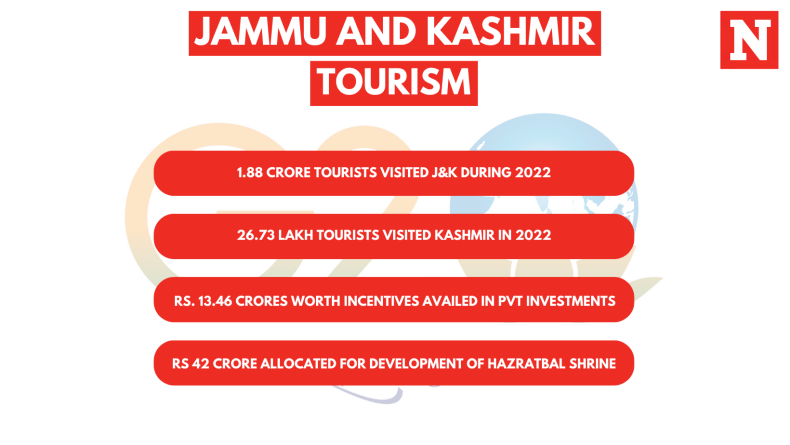
Newsweek
The government is already fixing the infrastructure of roads and connectivity here, but we want to showcase the infrastructure of the tourist places as well. With this, our economy will improve, and new sources of employment will be generated.
In the last meeting held in Goa or before that, important issues such as green tourism, MSME formation out of tourism, achieving the SDG goals by 2030 through tourism, and more were discussed. I am grateful to the citizens of Jammu and Kashmir who cooperated so wonderfully in the conduct of this important conference.
When it comes to the international community, by and large, we’ve seen that they have been supportive. For instance, Germany has been quite supportive of India holding this meeting of the G20 in Jammu and Kashmir. But your neighboring nation, Pakistan, has expressed its concern. Now, how do you respond to that as the first citizen of this union territory?
I believe that the presidency of the G20 is a matter of pride for India. Prime Minister Narendra Modi guided his government to ensure all regions got due representation when picking the venues for the G20 meetings. And Jammu and Kashmir, being an integral part of India, could not have been left behind.
All major G20 countries openly supported our idea, so naturally, when an international of such magnitude is organized in J&K, some people are bound to have problems with it. Now those who are the exporters of terror [reference to Pakistan] were obviously taken aback, and it was natural for them to make such horrid and threatening statements, which I think are not acceptable to any peace-loving nation. And I don’t think that it [the displeasure of Pakistan] is going to make any difference because the people of Jammu and Kashmir are sick and tired of their nefarious designs.
Now the neighboring nation that had a problem with such an event being held here should first handle and worry about the situation of their own troubled country instead of arbitrarily interfering in our internal matters.
When it came to the security for the G20 meeting, there were varied opinions about it; some felt it was too much, and a few felt it was too little. What’s your take on this?
It was neither too much nor too little. It was just appropriate. The situation in J&K in the last three years has changed a lot, and the people of Jammu and Kashmir have contributed a lot to this. Now people don’t want the replication of the past situation, where schools, colleges, and shops would remain shut. Jammu and Kashmir has now moved on, and so have our people. They just want peace, normalcy, development, and prosperity. Which they are experiencing now.
As far as security is concerned, when such threats [reference to the Pakistan foreign minister’s threat] were made by responsible people of our neighboring country, naturally, we were bound to be careful. We could not risk the safety of our foreign dignitaries and delegates.
Secondly, wherever such meetings are held, a tight security grid is maintained across the globe. In fact, in most places, it is much stricter. In J&K, we ensured adequate security for our guests, as was our duty, while ensuring our people were not inconvenienced, and the proof of this was evident given that normal life went on across the city, which a few years ago would have been unimaginable.
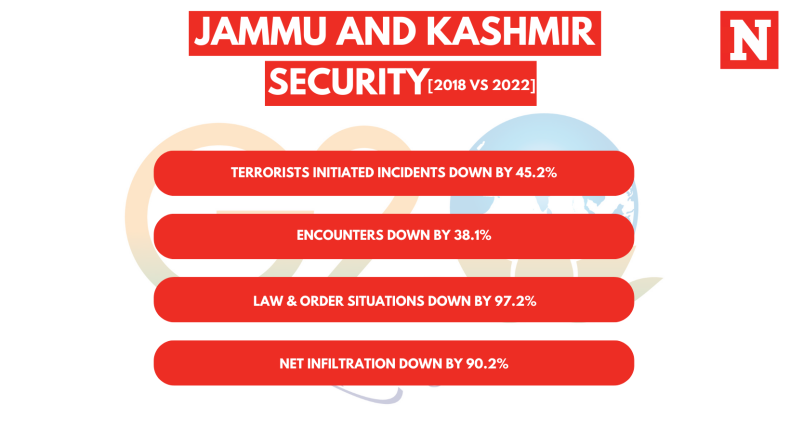
Newsweek
When it comes to tourists, especially those coming from the United States of America and European countries. They would often complain of accessibility issues and a lot of advisories when it came to J&K in terms of their travel. Is that expected to change?
Firstly, after this successful G20 event, I am hopeful that many nations will now withdraw their adverse advisories. Secondly, the atmosphere in J&K has completely changed now. We have left the dark past behind. What happened years ago caused fear in the minds of some nations, but after this meeting, their perspective is bound to change.
While our J&K is naturally blessed with pristine beauty, the situation was such that tourist infrastructure remained limited, but now in “New Kashmir,” we have made a major intervention by giving industry status to the hospitality and tourism sectors. In the days to come, expect world class facilities and tourism-related infrastructure in J&K. We favor private investments, as the government has no business being in business.
We have identified some land where good hotels could come up. Our efforts are to ensure sufficient availability of rooms and that the supply is equal to the demand. Just give us a few more years and see how this paradise on earth will flourish further. We are committed to it.
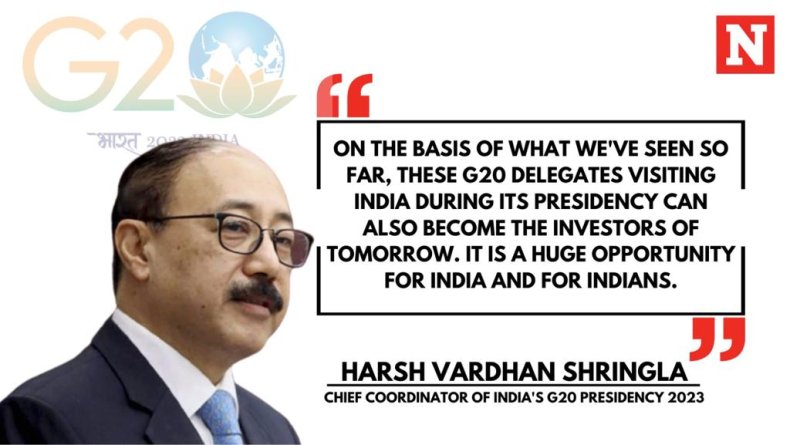
Newsweek


